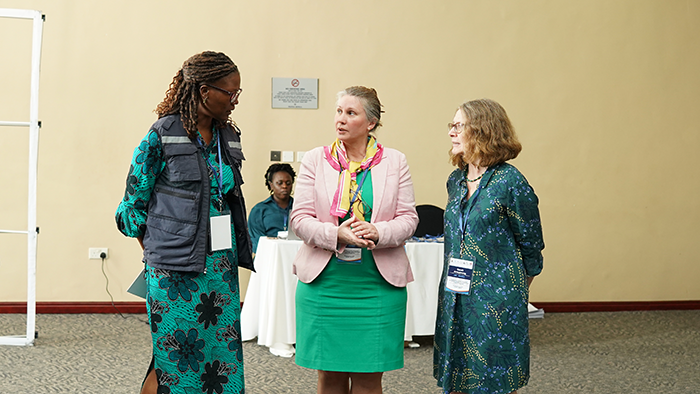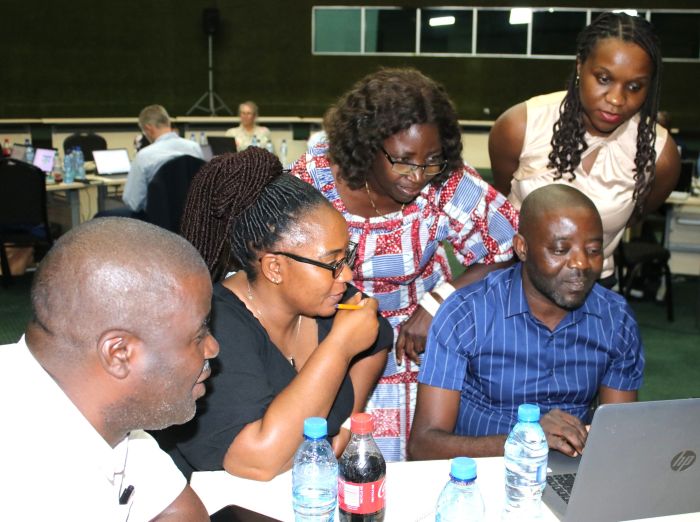UK-PHRST has worked alongside WHO Community Readiness and Resilience unit with several nations to co-develop Community Protection guidance, checklists, curricula and methods for countries managing disease outbreaks.
Uganda
In February 2025, UK-PHRST collaborated with the WHO Uganda country office, WHO AFRO and Community Readiness and Resilience unit of WHO Headquarters, the Ministry of Health Uganda and others to conduct a training on Ebola disease detection and management for Community Health Worker (CHW) representatives from Kole, Wakiso, and Mukono districts.

Image credits: WHO Uganda
Workshop aim
The aim of the workshop was to:
- Progress the co-development of the Ebola Community Health Workers' curriculum
- Enhance Uganda’s ability to prevent, detect, and respond to health emergencies
- Strengthen Uganda's response to the viral haemorrhagic fever outbreak occurring in the country at the time
Workshop highlights
The exercise underscored various challenges, such as economic downturns, lockdown-related impacts, system strains, public anxiety, and misinformation. It also highlighted the significant roles of community volunteers, health workers, wider sector organisations as well as government entities in outbreak and pandemic response.

Image credits: WHO Uganda
| Dr Claire Bayntun, UK-PHRST Head of Capacity Strengthening said: “We are delighted to have contributed our technical expertise to this community protection workshop alongside the World Health Organization at global, regional, and local levels, the Ministry of Health in Uganda and other partners. We hope this will help ensure Ugandan local communities are even better prepared for outbreaks." |
Zambia
In November 2025, National Trainers and Community Health Workers (CHW) in Zambia completed a Training of Trainers course using the Community Health Worker Training Package to support the implementation of guidance (enhanced community alert, preparedness, response and resilience capabilities) across Zambia.
Workshop aim
The workshop aimed to help to strengthen outbreak readiness and response at the community level in Zambia by:
- Ensuring there is a pool of national and regional instructors with enhanced technical knowledge and facilitation skills enabling them to contextualise the training for the Zambian context and facilitate CHW EPR training across Zambia
- There is a plan for the Ministry of Health and ZNPHI to roll-out, supervise and monitor and evaluate the CHW training for priority areas in Zambia
Workshop highlights
Using a series of interactive sessions, demonstrations, group work, case-scenarios and role-plays the workshop attendees were able to master the content of the CHW EPR training modules and practice facilitation, applying adult learning principles and participatory good practices. A roadmap for implementation was developed for all regions of Zambia, and ownership for monitoring and evaluating established.

Image credits: Zambia National Public Health Institute
|
Dr Claire Bayntun, UK-PHRST Head of Capacity Strengthening said: “We are delighted to have contributed our technical expertise to this training of the trainers exercise alongside the World Health Organization at global, regional and local levels, the Ministry of Health in Zambia, Zambia National Public Health Institute and other partners. We hope this will help ensure Zambian local communities are even better prepared for outbreaks. This exercise builds on our previous successful collaboration and exercises in Ghana and Uganda and our work to develop materials for use by other countries to tackle outbreaks like mpox. Bringing this workshop to Zambia has further strengthened our partnerships and reinforces the benefit of these exercises, as learnings are relevant for the public health responses for communities in many countries." |
UK-PHRST's role
These activities build on the UK-PHRST’s previous successful collaboration and simulation exercise in Ghana. In partnership across three levels of WHO (HQ, regional and country), UK-PHRST have co-developed Community Protection guidance, checklists, curriculum and methods and co-designed the CHW and National Training of Trainers training materials, as well as co-delivering modules in Uganda and Zambia.